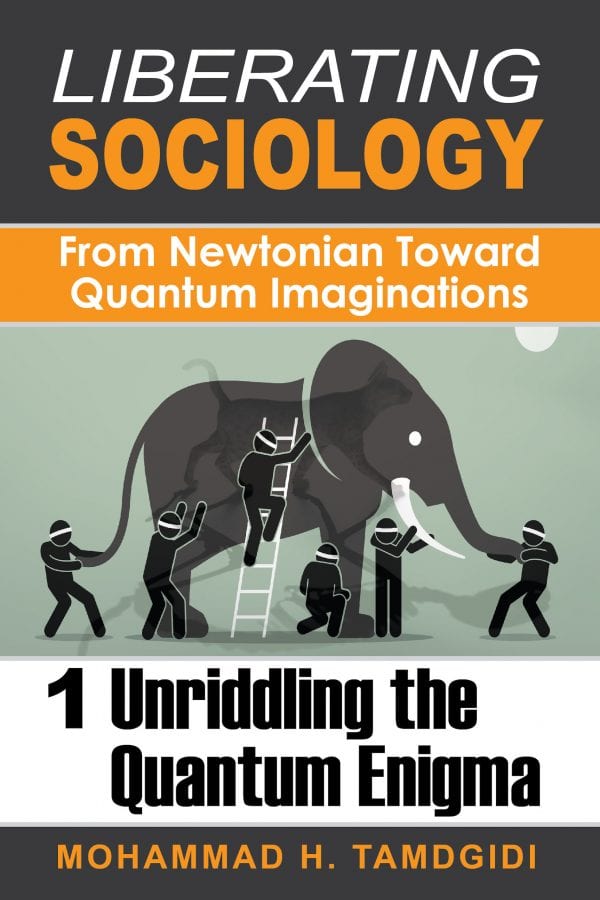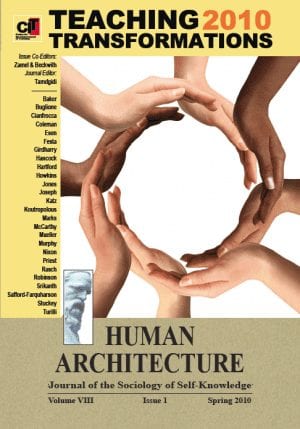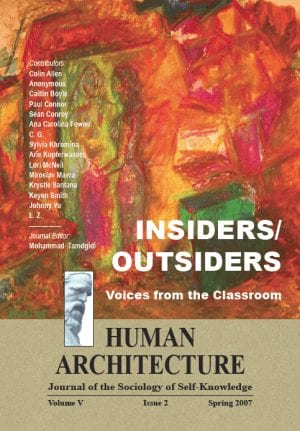Book Section: Conclusion: The Triumph of Transdisciplinarity and the Sociology of Self-Knowledge: Toward Quantum Sociological Imaginations — by Mohammad H. Tamdgidi
$20.00
This essay is a conclusion to the first volume of the series, Liberating Sociology: From Newtonian to Quantum Imaginations, subtitled Unriddling the Quantum Enigma, by Mohammad H. Tamdgidi. In this essay titled “Conclusion: The Triumph of Transdisciplinarity and the Sociology of Self-Knowledge: Toward Quantum Sociological Imaginations” Tamdgidi offers a chapter summary, a narrative summary, and a pointed synopsis of the findings of this study. He then returns to a roundtable of scholars he introduced early on in his book, trying to critically contribute to their work. He closes this conclusion and the book with a few notes on C. Wright Mills’s sociological imagination with which he began and to a deeper conceptual and applied exploration of which his further writings in the continuing series will be devoted.
Description
Abstract
This essay is a conclusion to the first volume of the series, Liberating Sociology: From Newtonian to Quantum Imaginations, subtitled Unriddling the Quantum Enigma, by Mohammad H. Tamdgidi. In this essay titled “Conclusion: The Triumph of Transdisciplinarity and the Sociology of Self-Knowledge: Toward Quantum Sociological Imaginations” Tamdgidi offers a chapter summary, a narrative summary, and a pointed synopsis of the findings of this study. He then returns to a roundtable of scholars he introduced early on in his book, trying to critically contribute to their work. He closes this conclusion and the book with a few notes on C. Wright Mills’s sociological imagination with which he began and to a deeper conceptual and applied exploration of which his further writings in the continuing series will be devoted.
Offering a gist of his findings, Tamdgidi suggests that his basic argument in this book has been that unriddling the so-called ‘quantum enigma’ depends on whether and how we succeed in dehabituating ourselves in favor of unified relativistic and quantum visions from the classical Newtonian ways of imagining reality that have fueled the enigma for more than a century. He has argued that the roots of the enigma surrounding the nature of reality can be traced to the rigidified and habitually Newtonian, binary, partial, and disciplinary modes of imagining reality that have subconsciously persisted in the ways we have gone about interpreting (or not) the enigma itself over the past decades. Once this veil is lifted and the enigma unriddled, it becomes possible to reinterpret the relativistic and quantum ways of imagining reality (including social reality) in terms of the unified, nonreductive dialectics of part and whole in order to develop quantum relativistic sociological imaginations, methods, theories, and practices that favor creativity and liberating social outcomes. The essays in this volume have tried to develop a relativistic solution to the so-called ‘quantum enigma’ in a transdisciplinary sociology of self-knowledge interpretive framework. They involve critical, comparative/integrative reflections on the relevant works of founding and contemporary scientists and scholars in the field.
This study’s findings can be regarded as a triumph for both what Basarab Nicolescu has called transdisciplinarity and what Tamdgidi calls the sociology of self-knowledge. The fusion of these folds of analysis as a framework made possible the unriddling of a thorny enigma that had lasted for decades. Tamdgidi suggests that the conversations on the quantum enigma will never be the same, whether or not scholars agree with his answers for the questions raised. It will never be the same, because the questions raised are fundamental and dialectically posed in such a way that the inner inconsistencies and falsehoods of many of the core building block narratives of the quantum enigma have been exposed. The cat is out of the compartmentalized and closed disciplinary bag of physics; the elephant has been shown a door.
What has allowed this study to problematize such taken-for-granted narratives has been a way of approaching them that is not bound to “physics” as a discipline, but is transdisciplinary, specifically addressing the spread-out social and sociological folds of the physical questions in a way that does not ignore the self-reflective fold of the sociological inquiry.
Relativistic and quantum sciences do matter to our selves and society as well. They tell the story of how we breathe, live, and experience life everyday, not just microscopically, but also macroscopically. We need to learn it not simply by way of what physicists report about the world, but also by way of how we understand and can change our everyday life realities, inner and broader, personal and public, to liberate the infinite possibilities inherent in us.
Recommended Citation
Tamdgidi, Mohammad H. 2020. “Conclusion: The Triumph of Transdisciplinarity and the Sociology of Self-Knowledge: Toward Quantum Sociological Imaginations.” Pp. 649-722 in Liberating Sociology: From Newtonian Toward Quantum Imaginations: Volume 1: Unriddling the Quantum Enigma. (Human Architecture: Journal of the Sociology of Self-Knowledge: Vol. XIII, Issue 1, 2020.) Belmont, MA: Okcir Press (an imprint of Ahead Publishing House).
The various editions of the volume of which this chapter is a part can be ordered from the Okcir Store and all major online bookstores worldwide (such as Amazon, Barnes&Noble, and others).
Read the Above Publication Online
To read the above publication online, you need to be logged in as an OKCIR Library member with a valid access. In that case just click on the large PDF icon below to access the publication. Make sure you refresh your browser page after logging in.








